|
|
|
Sort Order |
|
|
|
Items / Page
|
|
|
|
|
|
|
| Srl | Item |
| 1 |
ID:
172127
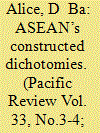

|
|
|
|
|
| Summary/Abstract |
How best to assess ASEAN as a collective enterprise are longstanding. Producing often polar assessments of the organization and its activities, the question has been a recurrent one in the scholarship on ASEAN and any retrospective on the organization. Stubbs’ (2019) article does not resolve the question, but it does offer ways to make sense of the debate. It also identifies ways forward with its identification of analytic criteria by which ASEAN’s performance as an international organization has been assessed. How well his two-camp categorization of the literature captures the state of play, however, can be debated. It is also not without potential costs.
|
|
|
|
|
|
|
|
|
|
|
|
|
|
|
|
| 2 |
ID:
113181
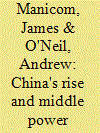

|
|
|
|
|
| Publication |
2012.
|
| Summary/Abstract |
Assessments of how international actors are responding to China's rise typically focus on rival great powers or on China's Asian neighbors. In these cases, relative power, geographic proximity, and regional institutions have conditioned relationships with China. The relationship of China with the developing world has mainly been defined by power asymmetry and the appeal of the Chinese governance model to authoritarian regimes. Largely absent from this discussion is an understanding of how Western middle power democracies are responding to China's rise. This article compares how Canada and Australia - two Western democratic states with prominent middle power foreign policy traditions - are responding to the rise of China. The two case studies are similar in many respects: both are resource-based economies with a track record of bilateral and institutional engagement in the Asia-Pacific, and both are key US allies. These similarities allow differences in the Canadian and Australian responses to China's rise to be isolated in the political, economic, and strategic realms.
|
|
|
|
|
|
|
|
|
|
|
|
|
|
|
|
| 3 |
ID:
087454
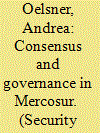

|
|
|
|
|
| Publication |
2009.
|
| Summary/Abstract |
This article constitutes a first exploration of the security governance of Mercosur, the common market of Latin America's Southern Cone. Drawing on securitization theory, the article argues that three major clusters of security issues have consecutively become the focus of the region's security agenda. First, prior to Mercosur's foundation and during the various processes of democratization in the region, the success of democratic transitions, the stabilization of civil-military relations and the region's insertion into the world economy were successfully securitized. At a second stage, more traditional issues associated with the use of military force gained centrality in the security agenda. Finally, and particularly since 11 September 2001, the region's security architecture was redesigned to accommodate `new' security threats. Around the consensuses on these three issue-clusters, formal and informal structures of policy coordination have emerged, constituting a limited system of governance. Yet, though regional governance is admittedly weak, this article contends that the security consensuses and the emerging institutional structures that have ensued are contributing to forging a shared normativity in the Mercosur area.
|
|
|
|
|
|
|
|
|
|
|
|
|
|
|
|
| 4 |
ID:
082464
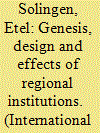

|
|
|
|
|
| Publication |
2008.
|
| Summary/Abstract |
Why do regional institutions emerge, what accounts for their variation in design, and what are their effects? Several conceptual and epistemological perspectives-neorealism, neoliberal-institutionalism, constructivism, and domestic politics-provide competing and complementary answers to these questions. I focus on regional organizations as productive arenas for developing contingent propositions on institutions more generally. The purpose is to advance cross-paradigmatic dialogue in two ways: through sensitivity to scope conditions and to institutional genesis, forms, and effects, in an effort to transcend axiomatic debates that often conflate different dependent variables. The empirical analysis includes the Association of Southeast Asian Nations (ASEAN), Asia-Pacific Economic Cooperation (APEC), ASEAN Regional Forum (ARF) and the Arab League. The main findings from these cases suggest that understanding the nature of dominant domestic coalitions is often crucial for explaining incentives to create, design, and fine-tune the effects of institutions. However, this is mainly the case when the consequences of creating or designing institutions for power distribution, transaction costs, and norms are negligible or hard to estimate. In many cases these consequences are sizeable, reducing the explanatory influence of domestic coalitions. The latter often provide no more than permissive conditions for the emergence, design, and effect of institutions. Their influence is most decisive in explaining institutional genesis but is often underdetermining in explaining their design
|
|
|
|
|
|
|
|
|
|
|
|
|
|
|
|
| 5 |
ID:
183253
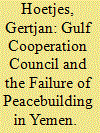

|
|
|
|
|
| Summary/Abstract |
Driven by increasing self-confidence and encouraged by Western states, Gulf Cooperation Council (GCC) states have gained a prominent role in multilateral efforts to foster peacebuilding in Yemen since the country experienced increased conflict from 2004 onwards. Based on the “negative and positive peace framework” proposed by Johan Galtung, it is possible to argue that the lack of focus of the GCC on fostering “positive peace” and disagreements between the Gulf monarchies heightened by hyper-nationalist tendencies inhibit the ability of this sub-regional organisation to facilitate peacebuilding in Yemen.
|
|
|
|
|
|
|
|
|
|
|
|
|
|
|
|
| 6 |
ID:
128525


|
|
|
|
|
| Publication |
2013.
|
| Summary/Abstract |
Much of the urban growth in developing countries is taking place along infrastructure corridors that connect cities. The villages along these corridors are frenzied and contested sites for the consolidation and conversion of agricultural lands for urban uses. The scale of changes along these corridors is larger than the political jurisdiction of local governments, and new regional institutions are emerging to manage land consolidations at this corridor scale. This article compares two inter-urban highways in India and the issue image_86_4_Hwy Urbanization - Balakrishnanhybrid regional institutions that manage them: the Bangalore- Mysore corridor, regulated by parastatals, and the Pune-Nashik corridor, by cooperatives. It traces the emergence of parastatals and cooperatives to the turn of the twentieth century, the ways in which these old institutions are being reworked to respond to the contemporary challenges of highway urbanization, and the winners and losers under these new institutional arrangements. I use the term "negotiated decentralization" to more accurately capture the back-and-forth negotiations between local, regional and state-level actors that leads to context-specific regional institutions like the parastatals and cooperatives
|
|
|
|
|
|
|
|
|
|
|
|
|
|
|
|
| 7 |
ID:
119645


|
|
|
|
|
| Publication |
2013.
|
| Summary/Abstract |
In the last 15 years, the link between identity and regional institutions has received considerable academic attention, especially from EU scholars. Mostly, their focus has been on the ways in which European institutions affect, constrain, or constitute (or otherwise) state's and individual actor's behavior and identities. By contrast, international relations has been strikingly silent on the question of the identity of regional institutions. However, studying an institution's identity can highlight important aspects of its "quality of life"; not least its ability to interact with other international actors and with its own constituent parts. This article argues that a clear identity is necessary for the organization to project itself internally, internationally, and temporally. The question of institutional identity-and the risks of failing to construct one-is explored by looking at the case of Mercosur, an association which, the article argues, suffers from identity crises in its three main identity dimension: political, economic and external.
|
|
|
|
|
|
|
|
|
|
|
|
|
|
|
|
| 8 |
ID:
098096


|
|
|
|
|
| Publication |
2010.
|
| Summary/Abstract |
A review of four periods and a comparison of three regional institutions provide evidence for how serious China has become about multilateralism with its neighbors in Asia. Approval for multilateralism does not mean that China is ready to endorse strong regional organizations that bind their members, especially when it has reservations both about institutions that could undermine its narrow notion of sovereignty and norms that could support US or even Japanese efforts to impose long-feared universal values. If China calculates that limited multilateralism now provides a variety of benefits, to date its support reflects specific circumstances, not general trust in this format. Focusing on the Six-Party Talks as the presumed foundation for regionalism in Northeast Asia offers a concentrated view of strategic thinking toward the area most vital to China's security. In the standoff between North Korea and the United States we are able to assess the degree to which China accepts working with four or five states and the prospects for its active support, if circumstances permit, for the establishment of a peace and security mechanism through the fifth working group that originated in the Joint Agreement of February 2007.
|
|
|
|
|
|
|
|
|
|
|
|
|
|
|
|
| 9 |
ID:
165156
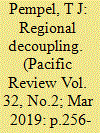

|
|
|
|
|
| Summary/Abstract |
This paper examines the interactions between the USA and the expanding ecosystem of East Asian and Asia-Pacific institutions. Concentrating on the period since the Global Financial Crisis of 2008–2009, it analyzes the ‘rival regionalisms’ that are now mushrooming throughout the region. Critical is the competition between nominally cooperative institutions and continued state-to-state suspicions that handicap efforts to forge regional institutions able to redress the region's most contentious issues. Nonetheless, national mistrust of regional bodies is less evident in areas such as trade and finance where many actors envision the possibility of win-win solutions even as they remain more difficult to envision in issues touching on hard security The paper concludes by exploring what looks to be a new American disengagement from Asia-Pacific regional institutions as a consequence of the presidency of Donald Trump.
|
|
|
|
|
|
|
|
|
|
|
|
|
|
|
|
| 10 |
ID:
075058
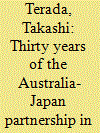

|
|
|
|
|
| Publication |
2006.
|
| Summary/Abstract |
This article reviews the development of the Australia-Japan partnership in building regional institutions such as the Pacific Economic Cooperation Council and the Asia-Pacific Economic Cooperation over the last three decades since the NARA Treaty was signed in 1976. In a unique partnership, academics, business people, politicians and officials in both countries were central to establishing these regional economic institutions. This article, however, argues that while both countries had shared understandings on regional issues during the first two decades after the treaty, the last decade has seen divergent regional understandings, especially over the rise of China. Japan sees the growing influence of China as a political obstacle due to growing bilateral tensions arising from historical and territorial issues, while Australia finds it a great economic opportunity to promote its trade with and attract investments from China. This differing understanding on China between both countries may act as a major hurdle to the effective and functional partnership in East Asian regionalism.
|
|
|
|
|
|
|
|
|
|
|
|
|
|
|
|
| 11 |
ID:
112794


|
|
|
|
|
| Publication |
2012.
|
| Summary/Abstract |
This article critically engages with recent scholarship that casts Russian foreign policy either in terms of a gradual evolution towards neo-imperialism, or alternatively as an episodic series of shifts on issues such as terrorism, energy, relations with great powers, and Russia's geostrategic position in contemporary international politics. It argues that since the end of the Cold War what has been striking about Russian foreign policy has been its continuity. To do this it examines several key policy arenas, including Russia's attempts to construct regional architecture to embed its hegemonic position; its recent preference for resource diplomacy, and its use of military force. It finds that while Russia has struggled to maintain hegemony in the former Soviet space due to the ongoing problem of weak material capabilities, the 'assertive' form of realism that characterizes its foreign policy has not altered significantly since shortly after the collapse of the USSR.
|
|
|
|
|
|
|
|
|
|
|
|
|
|
|
|
|
|
|
|
|